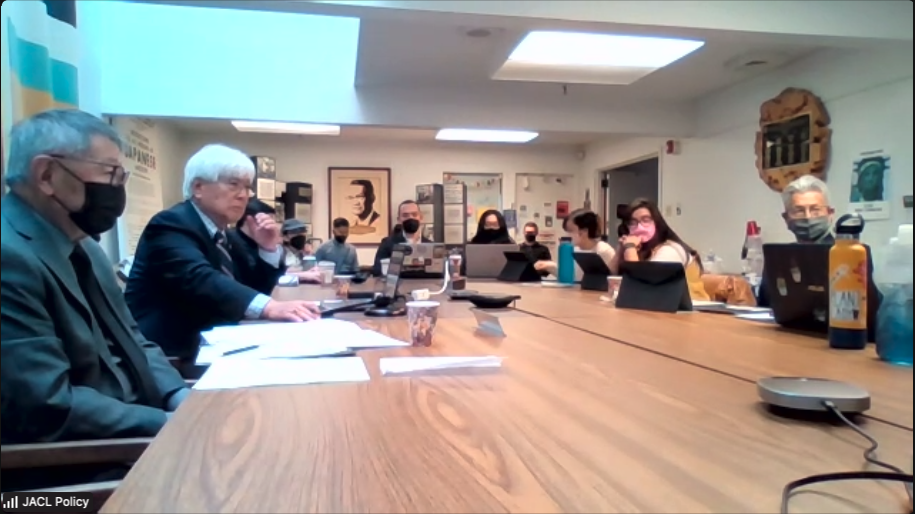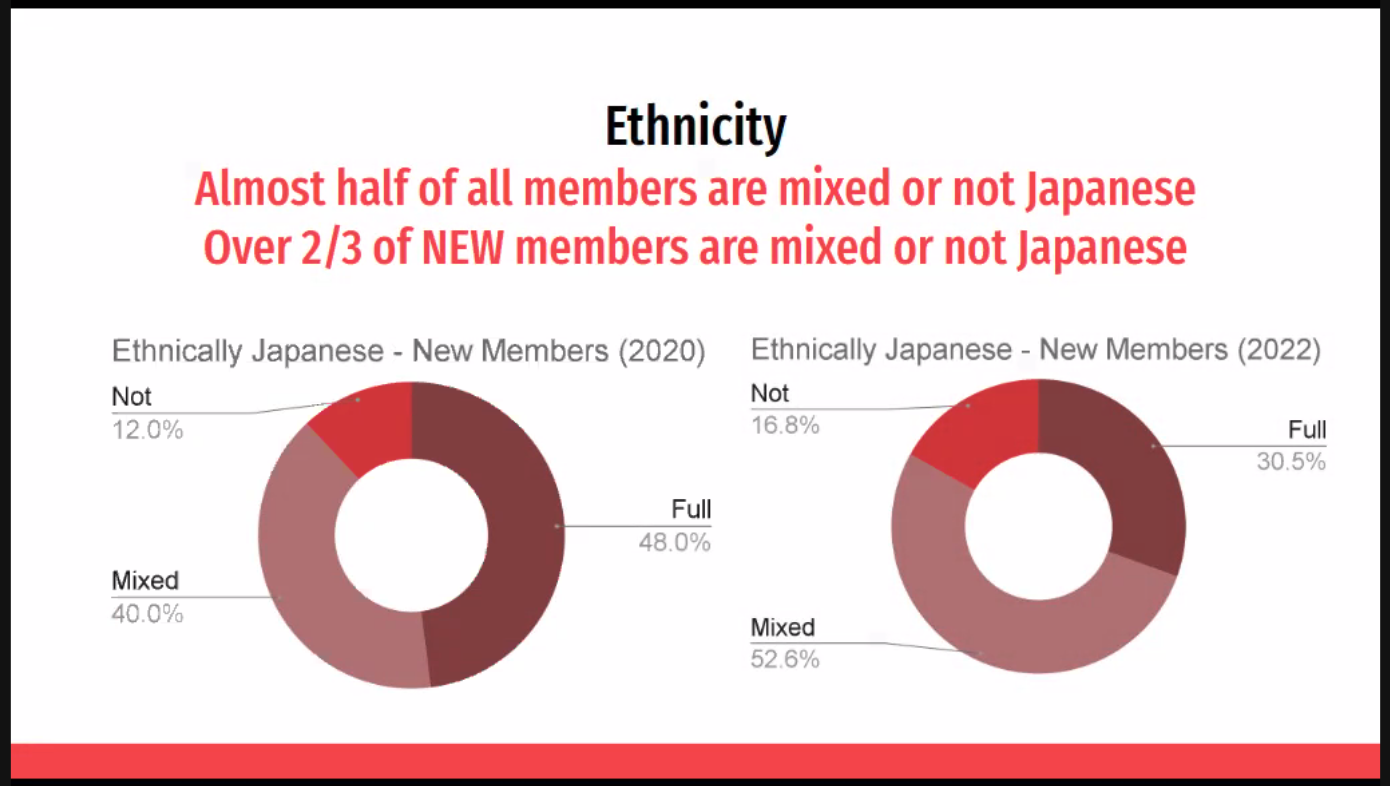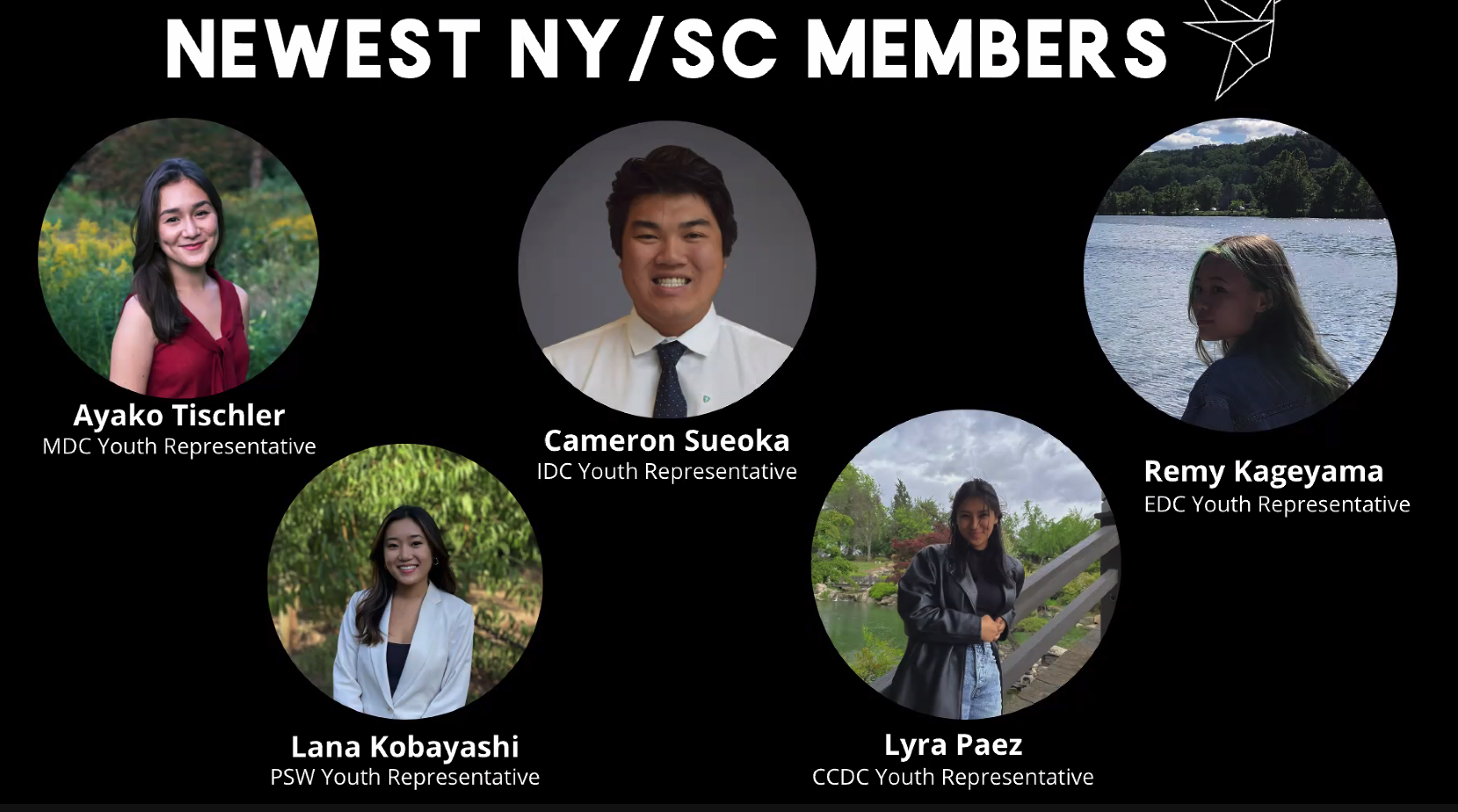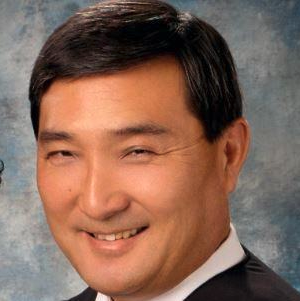
JACL National President Larry Oda (second from left) led the National Board in its first in-person meeting at the organization’s San Francisco headquarters in two years. (Photo: George Toshio Johnston)
National president leads 1st Nat’l Board meeting at HQ since 2010
By P.C. Staff
JACL National President Larry Oda led his first JACL National Board meeting at JACL’s National Headquarters in San Francisco since he was elected to the position at the organization’s Aug. 3–7 National Convention, held in Las Vegas. (See Pacific Citizen, Aug. 26, 2022.)
It was also his first time conducting one of these quarterly business meetings at the site in 12 years, when Oda had served as national president in two back-to-back biennia from 2006-10.
The board meeting, held both in-person and virtually, began at about 1:20 p.m. on Saturday, Nov. 5, preceded by a Visioning Session for the JACL National Board and staff that began at 9 a.m.
Conducted by Michael Kanazawa, principal and equity partner at EY, and assisted by Ko Nishimura, former CEO of Solectron, the Visioning Session looked at different case studies from the business world of how different companies adapted — or failed to adapt — to changing markets, technologies and the like, and how the lessons learned from those examples might apply to the future of JACL.
The duo also prompted discussion speculating on how JACL might plot a possible course of action by prognosticating where the organization might be in 40 years and working backward from there to the present to determine what steps might be considered now to grow and remain relevant amid changes to the status quo.
After conducting the pro forma duties such as the call to order, roll call, et al, Day One’s agenda included the National President’s report, during which Oda announced that he was “re-establishing the President’s Council of Corporate Advisors.”
“The three people that I have identified to act on this advisory committee are Michael Kanazawa, who you met this morning, Ko Nishimura, who you also met this morning and Jim Nakamura, who is a member of the Fresno chapter.” Oda described Nakamura as a “finance and development person to help us with fundraising,” and he promised to get copies of their individual résumés to board members.
Asked by Northern California District Regional Director Patty Wada why there were no women among Oda’s advisers, he answered that the two women he had asked failed to respond.
Oda also noted that Carol Kawamoto and Victor Kimura had, during a monthly board telephone call, already been approved to serve as VP of general operations and secretary/treasurer, respectively. Oda’s appointment of John Saito Jr. as Pacific Citizen Board chair was then approved by voice vote.
JACL Executive Director David Inoue provided the board’s longest report. He noted that “it’s been a very busy three months since convention,” and that the outcomes from the Nov. 8 midterm election would “have a significant impact on our strategy and what we can expect to accomplish in the next few years, depending on what happens.”
It was an allusion to items such as the Norman Y. Mineta Japanese American Confinement Education Act that is awaiting a vote by the full Senate. Inoue also spoke about the Minidoka/Lava Ridge Wind Farm Project, the future of affirmative action policies with regard to university admissions as the Supreme Court weighs in on the matter (See Pacific Citizen, Nov. 18, 2022), anti-Asian hate, the Asian American Museum, preparations for the April 2023 Leadership Summit and the revival of the Kakehashi program in March 2023.
Inoue said applications will become available in mid-November, but with only 40 participants, including chaperones, being able to participate. “It’ll be really incumbent upon anybody who is very interested in participating in this year to complete a very comprehensive application,” he said.
Because there was no Kakehashi program during the global pandemic, Inoue said dispensation was granted to accept participants up to 27 years of age “to accommodate for those people who would have otherwise gone in these past couple of years.”
Regarding the convention, Inoue said there were 233 registered participants who had checked in to the hotel and more than 50 people “who logged in at some point throughout the week as virtual attendees.”
Inoue also said that although there was “perhaps one major sponsor contribution” that was still outstanding, the convention nevertheless would result in red ink. Noting that the final accounting was still forthcoming, he said. “We are going to have a loss on this convention … and I expect it will be a little bit more than the 50,000 [dollars] that we had projected just prior to convention.” Part of the reason for the shortfall was attributed to the “loss of our consultant,” which created problems in convention planning and “resulted in some of the cost overruns.”
As for the next JACL National Convention, Inoue had few details to share, such as dates or hotel location, other than that it would take place during summer 2023 in Los Angeles and that there had been preliminary talks to use some of the facilities at the University of Southern California’s downtown-adjacent campus. As for a 2024 confab, he reported that one possibility might be in New Mexico. (Editor’s note: The executive director’s report can be viewed at tinyurl.com/y4twez2z)
Reporting next was General Operations VP Carol Kawamoto, one of the attendees who was present virtually. She thanked Inoue for covering most of the items she would have reported on, with the addition being her role as the lead on the JACL’s Personnel Committee. “I’m going to be working to re-ask people and fill the Personnel Committee so that it can continue to do its job,” she said.
Pacific Northwest District Council Gov. Sheldon Arakaki then asked Phil Ozaki, JACL’s Program Director, Membership and Fund Development, to provide an update on security upgrades for JACL Headquarters. “We qualified for the grant to stop API Hate and protecting the office building. … we’ll find out in a month or two,” Ozaki said, regarding whether the organization will receive a $180,000 grant from the state of California to fund much-needed security upgrades covering everything from cameras and lighting to cybersecurity.
Next on the agenda was a report by VP for Public Affairs Seia Watanabe. She noted that since the convention, on her watch the JACL has released three statements. “The first one was the salvation of signing the Inflation Reduction Act and the second was the response to Biden’s student debt cancelation and the third one, most recently, was the JACL reaffirming their support for affirmative action,” she said before asking Education and Communications coordinator Matthew Weisbly to update the board on the activities of the National Education Committee.
Alluding to a California Civil Liberties Public Education Program grant received earlier this year, Weisbly said that work is being done to “host teaching workshops across our three California districts next year,” and to “prepare the curriculum guide for the next update … as well as digitizing the actual guide and some of the programming that goes with it, for use by teachers and students across the country.
Up next was the report by Secretary/Treasurer Victor Kimura, who raised more questions than answers during his allotted time, during which at one point he said, “According to the financial documents in front of me, we’re about $365,000 under budget and revenue, and a little bit over budget in expenditures.”
It was suggested that Kimura hold a separate Finance Committee meeting to figure out the answers. It was also noted that JACL had recently received a number of bequests, including a particularly large one that, as one board member put it, would “would save us in any year.”
VP for Planning and Development David Lin reported on the Legacy Fund Grant and Scholarship Programs. Regarding the former, he said that “Patty Wada, the program manager, prepared the spreadsheet with the detailed information about the grants that we made this year, 2022, and submitted the information to Randall Gaines, and that the grant checks were processed and mailed out.”
Lin also said he was looking forward to working with co-chairs Sheldon Arakaki and Lisa Shiosaki Olsen, and he also thanked the two former co-chairs, Roberta Barton and Toshi Abe for their “outstanding service and contributions.”
As for the Scholarship Program, Lin said that the 2022 cycle is almost ready to close out and he acknowledged the efforts of staffers Matthew Weisbly and Patty Wada, and their work in continuing to implement improvements to the online application process.
Lin also reported on the status of the Centennial Education Fund. Launched in July 2021, he said that at present, the CEF had accumulated a sum of just under $2 million, via JACL member donations and by engaging corporations and foundations under the leadership of Phil Ozaki and David Inoue. According to Ozaki, the goal was to raise $3 million by 2024.
The final item Lin reported on was the status of the Investment Policy Committee (IPC). He noted that at the last National Board call, a change to a new investment manager was OK’d, and since then, the IPC had met with it — Vanguard — days before the National Board meeting. He noted that the onboarding JACL’s investment portfolio to Vanguard will “probably will take six to eight weeks.”
VP for 1000 Club and Membership and Services Dominique Mashburn’s report included a status update on JACL’s membership and the effect on its revenue. “As we do know them membership is on the decline, however, revenue has increased,” she said and showed a slide that covered the years 2018-22 and recorded a decline in membership from 8,662 to 7,633.
Despite the decline in membership, Mashburn added, “We project that there is going to be another 100,000 [dollars] between now and the end of the year, based off for 2020 and 2021 numbers because most people like to give at the end of the year.”
Membership coordinator Ashley Bucher followed and explained the results of last summer’s survey. “The main takeaway here is that friends and family really plant the seed,” she said with regard to the most-effective method by which non-JACLers become new members. One of the slides in her presentation noted, for example, that “a lot of non-members just need to be asked.” Later, Ozaki went into detail on the techniques used for the survey and said it was an example of “a very, very successful campaign.”

As for how people found JACL online, Bucher conveyed that the JACL.org website delivered the biggest percentage at 55.6%, followed by Facebook’s 27.8%, combining for nearly 80% via that avenue. As for the current demography of JACL, “full” Japanese Americans are mostly Sansei; Yonsei tend to be of mixed Japanese ancestry and “lean female”; and overall, they are “highly educated, they work in socially related industries like education, nonprofit, tech and finance” and are “concentrated in California.” As for new members in 2022, 16.8% are not ethnically Japanese; 30.5% are fully ethnic Japanese; and 52.6% are “mixed.”
Closing out Day One of the National Board meeting was the report for the National Youth/Student Council (See Pacific Citizen, Nov. 18, 2022.) presented by Sheera Tamura, NY/SC representative and Mika Chan, NY/SC chair, both of whom participated remotely. Tamura noted how the NY/SC had just recently held its Fall Retreat at JACL Headquarters prior to the National Board meeting.
Tamura reported that NY/SC raised $6,654 at the convention from gift basket sales, the proceeds of which will be used for “future retreats, future summits and just future programming on behalf of the NY/SC.”
Tamura next introduced the newest NY/SC members: 1) Ayako Tischler (MDC, Detroit Chapter); 2) Lana Kobayashi (PSWDC); 3) Cameron Sueoka (IDC, Salt Lake City Chapter); 4) Lyra Paez (CCDC); and 5) Remy Kageyama (EDC).

Chan recapped the Fall Retreat, which included such activities as a staff presentation on the history of JACL and membership, as well as a walking tour of San Francisco’s Japantown.
Chan also detailed plans for the NY/SC’s future activities, including a Back-to-School Campaign, In-Person District Youth Summits and more social media campaigns and virtual programming. “I think the whole board came out of retreat, feeling very motivated to not only work hard as members of the JACL and as youth leaders, but also to really support and uplift San Francisco’s Japantown.”
The meeting went into recess and continued on Sunday morning with the Pacific Citizen report, given by P.C. Executive Editor Allison Haramoto. She said that production for the annual Holiday Issue, the theme of which is “Together Again,” is underway. She also reported that the P.C. had completed its years-in-the-making move to a new office space, which it will share with the Pacific Southwest District and other JACL staffers on the second floor of Weller Court in Little Tokyo from smaller office space on the third floor.
Other reported items included:
- an update on the continuation of the digital archiving process, now focused on scanning decades of photos;
- results of the P.C.’s annual spring campaign, which as of the end of October, totaled $24,430 versus $7,655 at the same time in 2021; and
- how the P.C. is still awaiting reimbursement from JACL National regarding the move, which explains why the P.C.’s expenses were higher than normal.
PNW District Gov. Sheldon Arakaki provided the Governor’s Caucus Report. In addition to reporting that the Caucus had re-elected him for another year as caucus chair, other highlights were:
- the Oct. 28 Governor’s Caucus meeting, which was a one-hour telephone call;
- the topic of program manager accountability, of which the two questions posed were 1) what are your elected national member accountability expectations? and 2) what are your board accountability expectations for the governors?; and
- Discussion over Legacy Endowment Fund management policy implementation and voting on the Constitutional Bylaw Amendment
Following Arakaki’s presentation, President Oda segued into an explanation of the guiding principles and approach he intends to use during his administration.
“I work under a policy governance model, where the board is responsible for policy,” Oda said. “Staff is the part of the organization that implements a policy that the board decides. So, you know, the board does not direct the activities of staff.”
Next on the agenda was Old Business, which comprised updates on Legacy Fund Review Committee; Investment Policy Committee; and the Shikami Trust Distribution.
Under the Legacy Fund Review Committee topic, CCD Gov. Dale Ikeda was interested in having the new board vote to reaffirm past board actions with regard to supporting the proposal of the committee for a provision in the Legacy Fund Management Policy giving the Board authority to withdraw up to 2% of the Legacy Fund balance for “extraordinary, unforeseen and exigent circumstances” — but requiring that the National Reserve Fund first be depleted as a way to “ensure that the Legacy Fund is protected, and that it is prudent to make such a withdrawal.”
Part of that would also require that the Legacy Fund have at least $9 million in its coffers before any such withdrawals could be made. It was stated in the meeting that as of Oct. 31, the Legacy Fund had about $8.2 million. Although the previous board OK’d the provision, it had missed the submission deadline “due to timing issues regarding the bylaw amendment.”
Oda believed, however, that because it had already been approved, such a reaffirmation was unnecessary; he requested that this item be tabled until the next National Board call. Although Ikeda acquiesced, he said, “I want people to be ready to vote on it next time around, or voice any opposition to reverse the board action. I don’t want to be in the situation as last time, where the board kept deferring and deferring and deferring until we ran out of time.”

Dale Ikeda
Ikeda also wanted to have discussed at the December call-in meeting the topic of segregation of accounts (Policy Recommendation One) because along with the 32-year-old Legacy Fund are three other “baskets of funds” that had become intermingled. He described it as an accounting “nightmare.” Asked for his opinion, Lin said, “I do believe that it’s really important for us to try to figure it out, what is the precise corpus [of the Legacy Fund] versus the other buckets of money.”
Another Old Business topic that was decided to be discussed at the December call-in meeting was that of board policies. “This has come up several times before the board and been continued to give people more time to evaluate it. … Be prepared to vote on it at that time,” said Ikeda.
Regarding the Shikami Trust Distribution, Ikeda said, that the late Joe Shikami bequeathed $600,000 — 6% of his estate — to JACL National, which will go to the Centennial Fund, and that a second, much smaller distribution will also be forthcoming.
The final item under Old Business had to do with California charitable organization registrations, which Oda referred to as “some chapters that for whatever reason are in arrears on their registration.” At issue was why some California JACL chapters had failed to file RRF-1 forms which, according to Kimura, say, “I want the state of California to recognize our organization as a nonprofit organization.” He added that Carol Kawase had learned that payment notifications from the state about owing the annual $25 registration fee had been “going to national and not to the individual chapters.” The question of fault and who should pay the unpaid funds — and penalty fees — was raised.
“So, the whole thing turns out to be a mess. It’s very expensive,” said Kimura. “Our chapter consulted with our CPA. We sent in our $500 [fine]. Plus, we sent it and $175 to cover the six years. There’s a form that has to be filled out that answers a whole bunch of questions like, Why did you chapter ignore this? What are you going to do about in the future? How will this closing your nonprofit organization affect the community? So, I answered all those questions for our chapter.”
To that, Oda said, “I don’t know what the answer is,” adding that it is “an issue we need to we need to rectify.” He suggested discussing the topic in a smaller group to determine the next steps to take.
The last item of discussion was raised by Carol Kawamoto regarding the best way for board members who were interested in donating travel and lodging expenses to JACL. Though a bit convoluted, the consensus was that for record-keeping reasons board members submit an itemized form for reimbursement and submit it to JACL, which would then issue a check in that amount. Once remunerated, the board member could then donate that same amount back to JACL.
With that the board meeting adjourned and went into Executive Session to discuss the previous day’s Visioning Session.
Attending either one or both days of the Nov. 5-6 National Board meeting were:
(officers) Larry Oda, JACL national president; Victor Kimura, secretary/treasurer; Carol Kawamoto, VP for general operations; Dominque Mashburn, VP for 1000 Club, membership and services; Seia Watanabe, VP, for public affairs; Sheera Tamura, National Youth/Student Council representative; Mika Chan, National Youth/Student chair; and David Lin, VP for planning and development;
(governors) Dale Ikeda, Central California, District governor; Michael Asada, Eastern District governor; Lisa Shiosaki Olsen, Intermountain District governor; Eric Langowski, Midwest District governor; Carol Kawase, Northern California-Western Nevada-Pacific District governor; Sheldon Arakaki, Pacific Northwest District governor; Ryan Yoshikawa, Pacific Southwest District governor;
and (staff) Patty Wada, Northern California/Western Nevada/Pacific regional director; Cheyenne Cheng, Youth and Programs manager; Bridgette Watson, operations manager; Michael Tanaka, Daniel K. Inouye policy fellow; Bridget Keaveney, Norman Y. Mineta policy fellow; Ashley Bucher, Membership coordinator; Matthew Weisbly, Education and Communications coordinator; Phillip Ozaki, Program Director, Membership and Fund Development; Randall Gaines, JACL business manager (interim).



